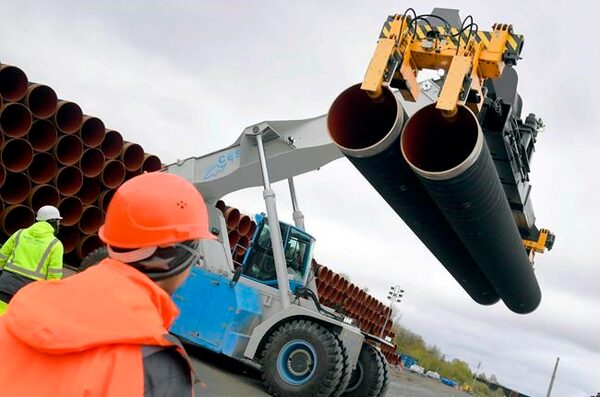
Steel pipes for the North Stream 2 pipeline are uploaded in Mukran harbour in Sassnitz, Germany.Stefan Sauer/The Canadian Press
The Kremlin on Thursday rejected U.S. President Donald Trump’s description of Germany as a “captive” of Russia due to its energy reliance, saying his statement was part of a U.S. campaign to bully Europe into buying American energy supplies.
Mr. Trump told Germany at a NATO summit in Brussels on Wednesday that it was wrong to support a $14.5-billion Baltic Sea pipeline to import even more Russian gas while being slow to meet NATO targets for defense spending.
Mr. Trump’s comments came ahead of his summit on Monday with Russian President Vladimir Putin in Helsinki, though the Kremlin said they were unlikely to have an impact on what was always going to be a difficult meeting due to the number of disagreements between the two countries.
Russia is keen to press ahead with the Nord Stream 2 pipeline since it has the potential to double its gas exports under the Baltic Sea to Germany, bypassing traditional routes through Ukraine with which it has poor relations.
However Washington opposes the project, and a spokesman for the U.S. State Department told Reuters on Wednesday that Western firms invested in the pipeline were at risk of sanctions.
Kremlin spokesman Dmitry Peskov said Trump’s statement marked an escalation of a U.S. campaign to talk down Russian gas supplies to Europe in an attempt to push the U.S. energy sector instead.
“As for Germany’s dependence [on Russia) as a major gas buyer, we cannot agree with this premise,” Mr. Peskov told reporters on a conference call. “Supplies of pipeline gas do not lead to dependence of one country on another but to complete mutual dependence. That is a guarantee of stability and future development.”
Mr. Peskov said Moscow regards U.S. objections to the new pipeline as “unfair competition” aimed at trying to force European countries to buy costlier liquefied natural gas from the United States..
“We consider that it’s a question of economic competition and that ... the buyers must take their own decision,” he said.
Speaking in Brussels, U.S. Secretary of Energy Rick Perry said he had not heard any of his European Union counterparts talk positively about Nord Stream 2 and said Washington didn’t like it because it didn’t promote diversity of supply.
“The President is pretty straightforward about what he believes and he thinks Nord Stream 2 is not in the European Union’s best interest, and my bet is he’ll be more than happy to tell President Putin that straight to his face,” said Mr. Perry.
Five Western firms have invested in Nord Stream 2 -- Wintershall and Uniper of Germany, Austria’s OMV, Anglo-Dutch Shell, and France’s Engie.